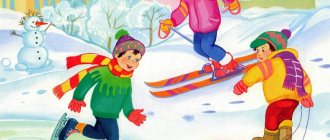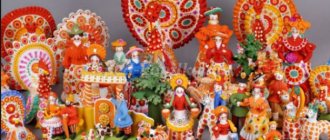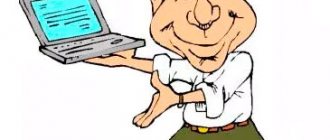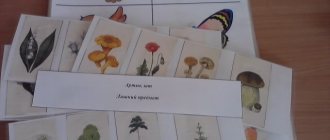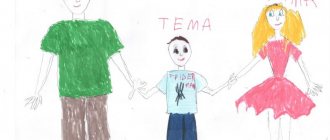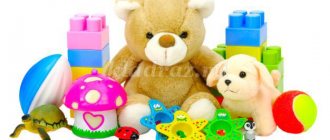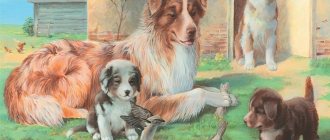Notes on speech development “Writing a descriptive story about toys” for children 3–4 years old
Lena Gerasimova
Notes on speech development “Writing a descriptive story about toys” for children 3–4 years old
Integration of educational areas: “ speech development ”
,
“artistic and aesthetic
development ” ,
“socio-communicative
development ” ,
“cognitive
development ” .
Types of children's activities: gaming, communicative, visual, motor.
– learn to write a descriptive story about toys with the help of a teacher;
– learn to compare different animals, highlighting opposite characteristics;
– activate adjectives in speech, including antonyms;
– consolidate the correct pronunciation of the sounds [m], [m'] in individual words, learn to pronounce words and phrases loudly and quietly;
– practice understanding and using spatial prepositions: in, on, under, about;
– consolidate knowledge about wild and domestic animals;
– develop imagination , creative abilities;
– cultivate activity, initiative, love for animals.
- visual ( looking at toys , pictures)
- verbal ( storytelling , conversation, speech pattern , guessing riddles)
— practical ( speech games and exercises , finger gymnastics, outdoor play, game situation, drawing)
Forms of organizing joint activities: individual, group, game.
Duration: 15 min
Participants: children of the second younger group (3-4 years old)
Materials and equipment: TV, laptop, toys (bear and fox, basket, pictures of “Pets”
, markers, sheets of white paper.
Lesson summary “Writing a descriptive story based on a toy”
Mazurenko Larisa
Lesson summary “Writing a descriptive story based on a toy”
Summary of a lesson on speech development for children of primary preschool age
Topic: Compiling a descriptive story about a toy - a cat , a bear, a mouse.
Goal: To develop the ability to write a descriptive story about a toy .
Coherent speech - learn to compose story with the help of an adult .
Vocabulary and grammar - consolidate in speech the names of animals known to them, teach them to use words denoting qualities and actions.
Sound culture of speech - to consolidate the correct, distinct pronunciation of the sounds [m]-[m'], [p]-[p'] in words and phrases, to learn to express requests politely. The child talks together with the teacher
Cultivate politeness and kindness.
Form of implementation: NOOD
Venue: group room
Form of organization: by subgroups
Integrated educational areas: cognitive development, artistic and aesthetic development, social and communicative development, physical development
Verbal: conversation, questions, teacher's story , explanations, instructions, encouragement.
Visual: looking at toys .
Game: surprise moment, “Name the Cub”
Practical: answer the teacher’s questions, compose a descriptive story for children .
Equipment and materials: toys - bear , mouse, cat, matryoshka, steam locomotive, pyramid, puppy, car, ball, screen, letter.
Preliminary work: asking riddles, reading works and poems about animals, learning short songs, looking at illustrations , playing with toys .
Surprise moment: Receiving a letter from a toy
There is a knock on the door: the postman brings a letter.
- Guys, there’s a letter here! On the envelope it’s written: Kostroma, st. Berezovy Proezd 6–a kindergarten No. 79, group “Zateiniki”
.
- Who do you think it’s for?
Educator: Correct! Let's read it! Reads the letter:
"Hello children. We invite you to visit the new store. We are waiting for you, Ma-sha doll.”
-Are the guys ready to hit the road and find out what’s on sale in the store?
And we will go to the store by “bus”
, take your seats.
-You and I have arrived at the store. Guys, did you hear the bell - the store opened (the teacher opens the screen curtain)
Look what's on sale in the store?
— That’s right, the store sells toys . Which?
-Let's look at them together . Who is this?
-What can you call a cat affectionately?
-Who wants to tell you about the cat ?
-It's a cat. She's... fluffy. The cat has...small ears,...eyes. And her nose... The cat's tail is... long. The kitty loves... milk, loves to lap up milk. She meows... Meow.
-What is this toy called ?
-Now we will play the game “Name the Cub”
. I will name the animal and pass the ball into the hands, and the one to whom I give the ball will name the baby of this animal. For example, “dog-puppy, cat-kitten, fox-fox, hare-hare, wolf-cub, goat-kid, frog-frog, bear-bear, hen-chick, duck-duckling, hedgehog-hedgehog, owl-owlet »
-Who's that squeaking? Pee-pee-pee!
- That's right, it's a mouse. Who wants to tell you about the mouse ?
-This is... a mouse. She...what? Small, yellow. The mouse has round ears. The mouse lives in...a hole. She loves...crusts, cheese. The mouse squeaks... pee-pee-pee.
- Who is this? What song about a bear do you know?
-Who will tell you about the bear ?
- The bear... is big, shaggy, lives in... the forest. Loves... honey, raspberries. What song about a bear do you know?
Physical exercise “The giraffe has spots, spots everywhere...”
toys in the store . Do you want to buy them?
-There is a seller in the store - this is a Masha doll. She sells toys , what does the seller do? And all the children will be buyers. What do buyers do?
you don’t need money to buy , you just need to politely ask the doll Masha to give her the toy that she liked and tell her how to play with it.
-Listen to how I will do it.
Masha, please give me the pyramid. It can be disassembled and reassembled. Thank you.
The game continues until all the children “buy”
yourself
a toy . As the game progresses, the teacher, on behalf of the doll, encourages the children to use exact names, asks again: “Do you want a big pyramid or a small one,”
etc.
- Look, all the children “bought”
get yourself a toy. Thank you Masha for inviting us to your store, but it’s time for us to return to kindergarten. Goodbye.
Get on the bus
, go.
- Here we are in kindergarten.
toy store ? What toys did you see there ? What were you doing in the store? Who were you? And now you can play with the toys that you “bought and drank”
Independent activities of children
Abstract of the educational activity “Composing a descriptive story about the toy “bear cub” for the second younger group Teddy bear Program tasks: Teach children to compose a short descriptive story (3-4 sentences) with the help of an adult. Activate.
Abstract of an educational activity on speech development using mnemonics “Compiling a descriptive story about a toy” Synopsis of organized educational activities on speech development using mnemonics “Compiling a descriptive story.
Summary of a lesson on speech development “Compiling a descriptive story on the subject. “Cabbage” Objectives: Educational: Clarifying and consolidating children’s knowledge about vegetables. Developmental: Consolidating the ability to write a descriptive story.
Notes for a lesson on speech development “Composing a descriptive story about a toy using diagrams” in the middle group Notes for a lesson on speech development in the middle group Topic: “Making a descriptive story about a toy using diagrams.” Software.
Lesson notes for the senior group “Composing a descriptive story about a vegetable” Goal: development of coherent monologue speech. Objectives: 1. Activate the subject vocabulary on the topic “vegetables”, consolidate the general concept.
Summary of educational activities for speech development “Making a descriptive story based on a toy” for children of the middle group Goal: teaching a descriptive story based on a toy. Tasks: Coherent speech: continue to teach children to name their characteristic features when describing animals.
Compiling a descriptive story based on a toy Purpose: teaching a descriptive story based on a toy. Tasks: Coherent speech: continue to teach children to name their characteristic features when describing animals.
Source
Lecture 8. Storytelling using toys
Children's statements about toys are based on the direct perception of the toy, which influences the sensory education of children and the development of observation skills. Activities with toys are creative in nature; they develop thinking and imagination. The toy creates an opportunity to consolidate and activate the vocabulary, but can also serve as a source of new words. The toy evokes positive emotions and a desire to speak out. Therefore, it is used as a means of teaching description and narration.
Activities with toys were developed by E.I. Tikheyeva. The system of teaching storytelling using toys remained unchanged for a long time. Later research and methodological developments (A. M. Borodich, E. P. Korotkova, O. I. Solovyova, N. A. Orlanova) introduced clarifications into the teaching methodology, while maintaining the essence of the previous system.
In the formation of coherent speech using toy material, researchers of recent years (O. S. Ushakova, A. A. Zrozhevskaya) proceeded from the fact that children should be taught not types of storytelling, but the ability to construct a monologue-description and a monologue-narration, based on categorical characteristics text.
The following types of toys are used to teach monologue speech:
· didactic (matryoshka dolls, turrets, pyramids, barrels);
· plot (figurative): dolls, cars, animals, dishes, furniture, transport; ready-made sets of toys united by one content: herd, zoo, poultry yard;
· sets compiled by the teacher or children - boy, girl, sleigh, dog; girl, house, chicken, cat; hare and dog.
Since each new toy brings joy, pleasure, and a desire to talk about it in the child, for classes you need to use new or somewhat updated familiar toys (a doll in a new dress, apron, hat; a bear sitting in a car). This will cause the child to have new thoughts, an emotional attitude towards the toy, and a speech reaction.
Types of activities on toys.
1. Description of a toy - a coherent, consistent description of the appearance of the toy, sometimes with the addition of the child’s personal attitude towards it, or a description of the actions and lifestyle of the living creature depicted in the toy.
The description of toys can be carried out in the form of a didactic game (“Toy store” (dishes, clothes), “Wonderful bag”, “Who is it?”, “The postman brought a parcel”, etc.). For the description, you should select toys that would attract the attention of children, that would be bright, expressive, and stand out in their appearance, so that you can express your opinion about them and compare them (two dolls in different costumes; two hares, different in color and size). Didactic games for description, as a rule, are carried out after several lessons in which children have acquired some skills in describing a toy, acquired a certain vocabulary and corresponding ideas. One of the conditions for the effectiveness of the game is its liveliness, a certain rhythm, emotionality, and the active participation of each child. If children do not know how to describe toys and need constant help and guidance from an adult, the play situation is disrupted and the game turns into a sluggish exercise.
One type of description of a toy is children guessing and composing riddles. First, children learn to solve riddles and then write descriptive riddles.
For example, children are offered 5-6 toys to examine their appearance and determine their qualities - color, shape, size, material. The appearance of toys can be played up - the postman brought a parcel. Then a riddle is given about one of the toys: “The mane on the neck is a wave, the tail is a pipe, there is a bang between the ears” (horse); “A shaggy one walks, a bearded one walks, waving his faces, shaking his beard, tapping his hooves” (ram).
Guessing riddles can be associated with looking at toys before describing them or telling stories about them. Gradually, children are led to composing riddles on their own.
2. Plot stories (narratives).
· a story about a set of toys – a coherent, sequential story about a group of toys, most often accompanied by the teacher’s playful actions with toys, like a dramatization game. Its compilation is made easier by the fact that the child talks about the actions that he himself performs. His speech is based on the activity of a number of analyzers;
· a story about a separate toy is a coherent, sequential story about the imaginary actions and adventures of one character - this toy. This is the most difficult type of storytelling. The toy only defines the main character, and the children themselves come up with images of other characters, actions and situations based on creative imagination and their own experience.
In the educational and methodological literature there is no single point of view on the content and methodology of conducting classes with children, on the sequence of setting tasks for teaching descriptive and narrative speech, and the sequence of different types of activities with toys. Based on research and work experience, we will outline our understanding of the methodology for teaching coherent speech using toys.
Let us recall that in classes with toys, children should be taught the speech skills necessary for composing descriptive and narrative monologues: to form a basic understanding of the structure of the text and to teach how to connect sentences and parts of statements. In the description - define the object, consistently describe its parts, properties, qualities, actions, and at the end make a value judgment. In storytelling - highlight the main theme, develop the plot and follow the structure (commencement, development of action, climax, denouement).
Let's consider the methodology for teaching monologue speech in classes with toys.
In early preschool age, the first task is to teach children to concentrate when looking at toys and objects, then to teach them to answer questions based on their description. With the help of the teacher, children are led to compose statements about toys from 2 to 3 sentences. Individually and in subgroups, a conversation is organized: what toys do you have at home? Which toy do you like best? Who bought it or gave it? What is it (size, color, material)? How do you play with her? What toys do you like in kindergarten?
At first, the choice of toys for activities is especially important. They should attract the attention of children with pronounced qualities (color, shape, size), activate speech, and create a mood. Toys can be the same in name, but different in appearance (a large doll in a coat and a beret, a small doll in a blanket and a stroller; white and black cats).
During the lesson, teaching descriptive skills can be organized in the game “Find and Describe”. Different toys are selected: two dolls - one with a bow, the other without a bow, two cats of different colors. The toys are examined and compared one by one; their characteristic features and differences are clarified; The dictionary is activated. Then the teacher “hides” the toys (so that the children quickly find them) and offers to find them: “Andryusha will find a white cat, Misha will find a black one, and Sonya will find a doll with a bow.” Children find and bring toys, name them and use the teacher’s questions to describe them (“What kind of cat do you have? What’s on the cat’s head? What is this?”). As a result of such a conversation, the children’s scattered answers are summarized in the form of a coherent statement: “Misha found a black cat. She has ears on her head, big eyes, and a mustache. The cat also has a long tail. She laps up the milk and meows: meow! meow!"
When children learn to answer questions well and correctly, they are asked to repeat the teacher’s description. Thus, techniques are used here aimed at helping the child describe the subject: examination, questions, generalization by the teacher (description example).
At the next stage, we can recommend the joint compilation of a description (FOOTNOTE: In disclosing the methodology for teaching descriptive and narrative speech, research conducted under the leadership of F. A. Sokhin and O. S. Ushakova was used).
A kitten comes to visit the children. They examine him (“What kind of kitten? – Small, fluffy, playful. – How can you call him affectionately? – Kitten, little cat. – What does a cat like? – Milk. – Let’s tell about him together”). A logical-syntactic description scheme is given: the teacher begins the sentence, and the children continue: “This is (a kitten). He (small, fluffy). The kitten loves (milk). Who wants to tell you about the kitten?
Other types of activities with toys are carried out as a teacher’s story for children. Simple story scenes with a set of toys are invented, the story is accompanied by dramatization, which includes the children's statements during the action.
Poems, nursery rhymes, and riddles are used in classes to describe toys. So, a teacher can ask a riddle about a dog: “He is friends with the owner, guards the house, lives under the porch, tail is a ring.” After guessing the riddle, the toy is shown, examined and described. The lesson ends with reading nursery rhymes and poems.
In middle preschool age, the foundations are laid for developing the ability to independently describe toys and independently compose a story about them.
The description of toys and the compilation of stories about toys precedes their examination, during which the features of the appearance and lifestyle of the living creature embodied in the toy are clarified, comparisons and definitions are selected. You can specifically give figurative words and phrases: timid hare; cautious, cunning fox; black, shaggy, soft bear, etc.; conduct a vocabulary exercise.
During the learning process, children must intuitively understand that the description is carried out according to a certain plan. This is facilitated by a properly organized process of examining toys and thoughtful formulation of questions and special exercises.
The sequence of presentation in the description depends on the children’s ability to examine the object step by step - from perceiving it as a whole to identifying essential features. Therefore, the teacher asks questions in a certain order, teaches children to think in what order they will describe the toy. This will help keep the logic of the description.
Constructing a coherent text causes difficulty for children. They often do not know how to start a statement and how to end it, or how to connect sentences. Research shows that already in the process of looking at toys, children should be shown possible connections between sentences in question-and-answer form. The most common means of communication is repetition of words (This is a kitten. The kitten is small. The kitten has fluffy fur). While looking at a hedgehog, you can do the exercise: “Who is this?” - “It’s a hedgehog.” - “Who is prickly?” - “Prickly hedgehog.” - “Who has needles on his back?” - “The hedgehog has needles on its back.” The question contains a key word that the child will use in his answer.
Another option for asking questions is when the correct form of repeated words is in the question itself: “Who is this?” - “Bunny.” - “What kind of ears does a hare have?” - “The hare has long ears.” - “What kind of tail does a hare have?” - “The hare has a short tail.”
Then you can use the technique when children, following the example, describe the toy.
“Say it like Petrushka,” “Say it like me.” Parsley and the child receive the same toys, but one bear is large black, and the other is small brown. Parsley: “I have a big black bear.”
Child: “I also have a bear, but it’s small and brown.” Parsley: “My bear has round, fluffy ears.” Child: “My bear also has round fluffy ears,” etc.
Parsley: “I have a big beautiful doll.” Child: “I have a big white car.” Parsley: “The doll has black eyes and blond hair.” Child: “The car has a steering wheel and round wheels,” etc.
In the first option, children restore the description structure proposed to them, replacing only two words. In the second, children, while maintaining the structure of the sentence, independently fill it with new words.
When children learn to describe a toy with the help of an adult, you can offer to describe one of 3 - 4 toys based on a sample of one of them. In addition to the sample, other techniques are used: word prompt, addition, joint description, encouragement. At the end of the lesson, to maintain interest, you need to show a wind-up or other toy.
At the same time, children develop narrative speech skills. Children are led to compose stories also based on questions from the teacher. It is important to form elementary ideas about the structure of a statement (beginning, middle, end). To understand the structure of the story, it is recommended to use a scheme for composing a story together with children. First, an idea is given of how you can start a story in different ways (“Once upon a time,” “Once upon a time,” “It was in the summer”). Giving the beginning of a story, the adult invites the child to fill it with content.
Let’s give an example of the outline of the story “Into the forest to pick berries”: “It was... (in the summer). We got together... (friends go to the forest to pick berries). They took... (baskets) and... (went to the forest). The girls are walking and having fun... (talking). ... (dark clouds) appeared in the sky. Suddenly it thundered... (thunder) and... (it started to rain). The girls... (frightened) and... (hid the subtree). When the rain stopped, they... (went home).”
Filling out the diagram helps the child to master the means of connection between sentences and parts of the text, and develops the ability to use linking words suddenly, then.
Gradually, children begin to compose stories on their own. The teacher helps develop the plot using linking words, verbal vocabulary (called - ran away, met, etc.), taught to include dialogue between the characters (asked - answered), elements of describing the appearance of the characters. First, 2-3 toys are selected for the story. It is easier for children to develop the plot and include all the characters in the story, match words to actions, and use direct speech. Later, the number of toys can be increased.
At this stage, the main teaching technique is a sample, which is given after examination. Let us give an example of the story “The Dog and the Hare”. “One day Zhuchka went out into the street. She walked and walked, and she wanted to eat. Suddenly a hare comes towards you. Bug came up to him and said: “Hello, bunny!” The hare replies: “Hello, Bug!” - “Do you have anything to eat?” - “There is a carrot, please take it!” Bug sniffed the carrot and shook her head: “No, thank you, I don’t eat carrots.” And they each went their own way.”
Children like such texts; they themselves want to come up with a similar story or fairy tale. The teacher can act out scenes with these toys. For storytelling, toys are combined in twos (doll and dog, cat and mouse, doll and car). Typically, stories are composed by children in the second part of the lesson, after examining or describing toys.
Didactic games for description occupy a significant place. Their content and requirements for speech become more complex. In the Toy Store game, a child buyer must describe a toy based on a sample or plan, and the seller must guess what kind of toy it is and sell it. A condition for receiving a toy, in addition to a description, may be the requirement to name the department or shelf on which it stands. The seller may not immediately understand what kind of toy they want to buy, and offers to describe it more clearly.
If at primary preschool age children mainly learn to solve riddles, then at this age stage they themselves make up riddles based on the teacher’s model. As always, toys are considered. The teacher begins with his sample: “Cunning, red-haired, with a long muzzle and a bushy tail. Who is this?" Children make riddles about other toys or objects. Despite the fact that composing riddles is difficult, with appropriate training in descriptive speech, children successfully cope with it: “With long ears, a short tail, loves carrots”; “With a beard, horns, and gives milk.” When evaluating descriptions of toys, it is necessary to note the accuracy of the dictionary, successful comparisons, and emotionality.
In older preschool age, the toy occupies a smaller place, but higher demands are placed on the ability to describe the toy and construct a narrative. The description must be complete, logical, without omitting essential features, repetitions, consistent, accurate in language, using figurative speech. Children must create a narrative for a set of toys and one toy at a time, determining the theme, developing the plot and observing the composition.
Children acquire descriptive skills, as in middle preschool age, in the process of describing toys and composing riddles. The main difference is the complexity of tasks and greater independence in completing them.
In the pre-school group, a more complete description of the characteristics is given (if it is an animal, they talk about its usefulness, lifestyle, habits). A competitive element is introduced into the description (“Who can best tell about the toy”). In the lesson “Our Favorite Toys” (bear cub, bunny, telephone, tumbler, dump truck), one child describes the toy without naming it, and the rest guess. You can end the lesson with a sentence to tell about your favorite toy that is at home, so that everyone understands what it is. At the end, you can give the task to carefully examine the toy at home and the next day add your description or think and tell how you can play with this toy.
A similar task - to consistently describe a toy without naming it - is given in the game "Gifts". Organization of the lesson: new toys are brought in boxes, these are gifts for the group. The appearance of gifts is played out (given by Santa Claus, the postman brought it in a parcel). It is proposed to get acquainted with what gifts are in the boxes, but two conditions must be met: describe the toy well and guess it. If these conditions are met, the toy will remain in the group (motivational setting). Then call 3 - 4 children (according to the number of toys). They must open the boxes and, without taking out the toy, look at it and think about the sequence in which to construct the description, ending with a value judgment.
The value of such activities is in leading children to write riddles. When composing riddles, the model is almost not used; children cope with the task on their own. It is useful to use description schemes (they were mentioned when describing techniques for teaching storytelling).
Older preschoolers compose a story based on a set of toys that are either offered to them or chosen by the child independently.
Let's give an example of a story based on the game setting "Visiting Katya." The teacher accompanies his story by acting out skits: “Katya is a schoolgirl. She learned to read well. Her younger friends come to visit her. Then one day there was a knock on the door. Who is this? It was Tanya and Olya who came. Tanya is wearing a blue dress with a white collar and cuffs. On her feet are white sandals. Olya came in white trousers and a red blouse. On her feet are white socks and black shoes. Both girlfriends are smart and cheerful. We said hello and sat down at the table. Katya began to read to them a fairy tale about a wolf and seven kids. And then they looked at the pictures. And so time passed. It's time to go home. Well done Katya! Little kids love her." Then the children themselves perform dramatizations.
Having changed the play environment, replacing the book with a tea set, to prevent mechanical imitation, the children are asked to tell about Katya and her friends without a model, using a plan: where did mom go? What did children do without their mother? What did she say when she returned?
It is advisable to carry out such dramatizations outside of class, and show the most successful one to the kids. This motivation makes children want to complete the task. It is necessary to discuss collectively what is best to show, supplement the dramatization with new scenes, and conduct a rehearsal.
The most difficult thing is to come up with a story based on one toy. The child must activate his experience, memory, and imagination. The difficulty is that only one character is defined, others are invented by the child. The storyteller must endow each character with the appropriate qualities, find a place for him in the story, come up with actions and the entire plot, and compose the story correctly. The choice of teaching method should be approached taking into account the topic, children’s skills, and their ideas about the structure of the story. The model is a stimulator of children's creativity (and not imitation), so it is better to give it after 1 - 2 children's stories.
The simplest technique is a sample in the form of the beginning of a story, when the teacher begins and the children continue the story.
In the story “The Adventure of the Rabbit,” you can give an outline in the form of general questions: “Where could the rabbit go? Who were his friends? What happened to him? How did their adventure end? The plan outlines the main milestones of the story, and the children fill it with content. It is advisable to use small instructions: “What could have happened to the rabbit and his friends? Maybe they saw a wolf in the forest and got scared or got lost, or maybe they came to visit the kindergarten.”
At an older age, work continues on the structure of the statement. Descriptive and narrative texts are analyzed from the point of view of their structure, work is carried out with models (a circle divided into parts; diagrams), the possible beginning of the story is discussed; Children's speech is enriched with linking words to connect sentences. Children’s speech activity is activated by the use of written speech situations, analysis of children’s statements (successful plot development, interesting adventures, figurative speech, expressiveness, unsuccessful moments), task motivation (telling a story so that everyone will like it, making someone happy).
Interesting activities with toys are described in a number of teaching aids. Particularly noteworthy are the games-activities developed by E. P. Korotkova (FOOTNOTE: Korotkova E. P. Teaching preschool children storytelling. - M., 1982). On them, learning to describe toys is carried out simultaneously with the formation of grammatically correct speech and the enrichment of vocabulary. Description tasks are gradually becoming more complex, speech motivation techniques are used, and children’s play activities are enriched.
